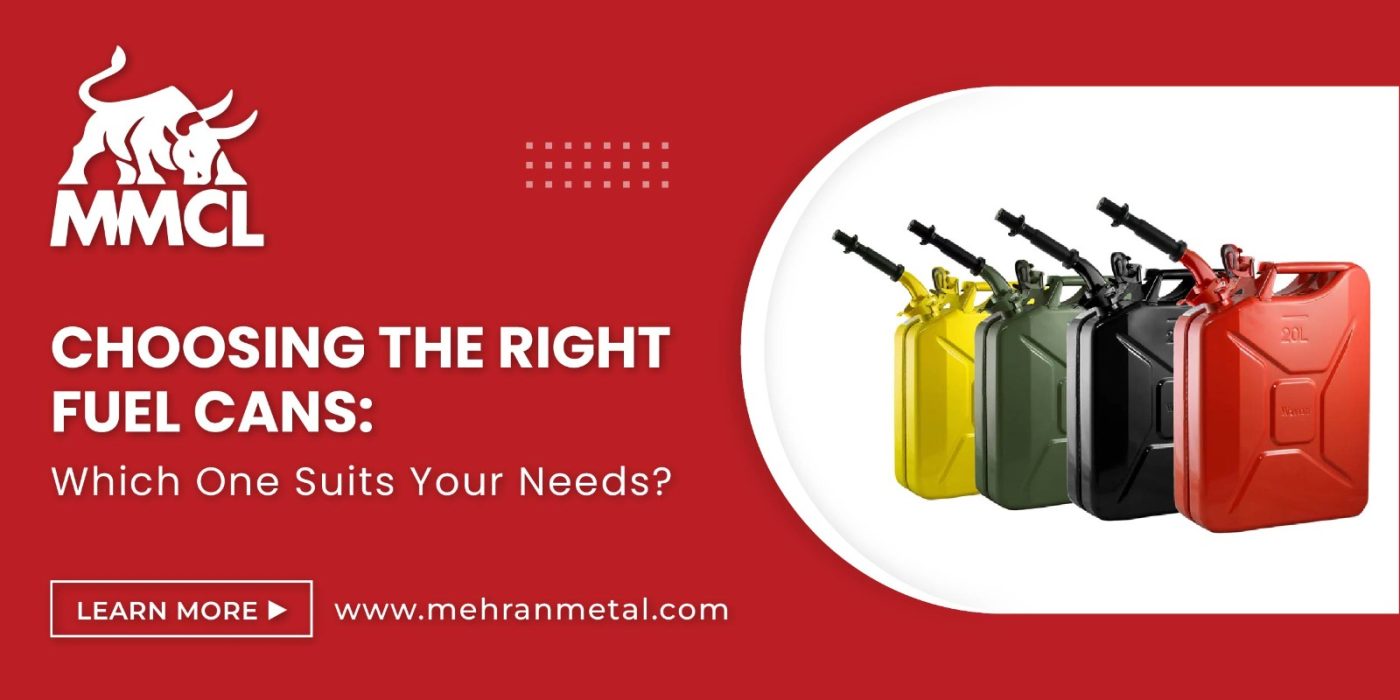A fuel can is a must-have item in your garage or workshop if you own a motor vehicle or other mechanical equipment. Regardless of whether fuel is being transported or stored for personal usage, recreational activities, or emergency preparedness, fuel cans are an indispensable tool. Choosing fuel cans that fulfill safety regulations and align with your particular demands can be an overwhelming task, given the numerous options available in the market. But not every fuel can is made identical, and picking the wrong container might be disastrous. The next section will go over the different kinds of fuel cans and what you need to look for when choosing one.
Material Matters
A fuel can’s durability and compatibility with various fuels is greatly determined by the material used in its manufacture. The type of fuel can you choose should be based on your requirements as different materials are used to make them. Typically, fuel cans are available in two distinct material compositions: plastic (high-density polyethylene) and metal (steel or aluminum).
Plastic fuel cans are perfect for those who routinely transport fuel since they are lightweight and convenient to handle. While they are more affordable, they are not ideal for long-term fuel storage. Fuel cans composed of metal are durable and resistant to extreme temperatures, but they are also heavy and susceptible to corrosion. However, they’re fantastic for storing fuel for an extended period. Jerry cans, on the other hand, are heavy-duty and intended for military usage. Because of their sturdy metal design, they are excellent for transporting and storing fuel in extreme conditions.
Fuel Type Considerations
Storage and transportation needs vary depending on the specific type of fuel. Whether it’s petroleum, diesel, kerosene, or propane, one must consider factors such as compatibility, flammability, and volatility when selecting the right fuel cans. Comprehending these factors is essential to guarantee the durability and safety of the fuel and the containers that contain it.
Color variations are another feature of fuel cans. The color of a can gives information about the kind of fuel it is intended to contain. The following three colors are available for fuel cans:
• For transporting gasoline, red-colored gas cans have been developed.
• For transportation and storage of diesel, use yellow-colored petroleum cans.
• For kerosene, blue-colored fuel containers serve the purpose.
Safety Measures and Regulations
To prevent accidents and adhere to legal requirements, fuel cans must be equipped with the appropriate safety measures. Critical safety components such as childproof latches, pressure relief valves, and flame arrestors are essential.
Selecting a fuel can with safety features is crucial to avoid potential risks including spills, leaks, and explosions. Spills are less likely with a self-closing lid. The can should have a tight-fitting lid that closes snugly when not in use as well as is simple to open and close. Additionally, it must be equipped with a fuel-pouring nozzle to prevent spillage. An explosion-proof fuel can is achieved by pressure relief. A fuel can that is equipped with such a feature will release energy automatically at a pressure of three to five pounds per square inch. It will then immediately reseal itself.
For further safety against explosions, the spout must feature a flame arrestor. Gas vapors can ignite a fire quite rapidly. A flame arrestor is a screen that keeps the fuel cans from blowing up due to an external flame. In the circumstance where the gas vapors catch fire outside the container, the flame arrestor keeps the fire from coming in contact with the gas vapors inside the container.
Size and Capacity Considerations
For practicality and ease of use, it is of the utmost importance to choose fuel cans with the right size and capacity. Depending on the quantity of fuel you need to transport or store, you can pick from multiple available fuel can sizes. A fuel can with a capacity of one gallon is great if you need it for necessities like generators and lawnmowers.
A five-gallon Jerry Fuel Can is appropriate for heavier machinery and automobiles. You should verify your local rules as most states have restrictions on the amount of fuel you are permitted to carry around.
Portability and Convenience
Transporting fuel cans ought to be effortless, which is why additional features like ergonomic designs, pour spouts, stackable designs, and built-in grips optimize portability and convenience. Furthermore, not every fuel can be manufactured to the same level, and several brands are renowned for producing high-quality fuel storage cans. It’s vital to purchase a fuel can from a reputable brand to ensure your safety.
All things considered, choosing the best fuel can for your particular requirements is essential for the preservation of your property, for the well-being of other individuals, and for your own safety. Think about the manufacturer, capacity, material, and safety features while making your choice.
Guidelines for Safe Usage of Fuel Cans
When making use of fuel cans, remember the following safety precautions:
• Avoid filling the fuel can next to a flickering flame or spark.
• Fuel fumes are detrimental to the respiratory system, therefore never breathe them in.
• Since gas expands as the temperature rises, you should never fill your gas can over 95 percent of its capacity to the maximum.
• Whenever you fill a fuel can, always position it on ground level.
• Make sure the filler nozzle touches the filler’s rim to help disperse static charge.
• Before filling up, always be sure to switch off the vehicle’s engine.
• Before placing the can inside the vessel, make sure its exterior is free of fuel using a piece of cloth or hose.
• To ensure that you’re ready for any unforeseen fuel shortage, be sure to have an extra fuel can in the supply of stuff associated with your vehicle.
Final Remarks
In a nutshell, choosing the right fuel cans is essential to guarantee the efficient and safe transportation and storage of fuels. You’ll be able to make an informed decision if you evaluate the material, fuel type, safety features, size, portability, and maintenance. Never forget to check pertinent sources for correct information and to be mindful of local laws and fuel-specific restrictions. We hope that our comprehensive guidance will enable you to select the most suitable fuel cans for your particular needs.

